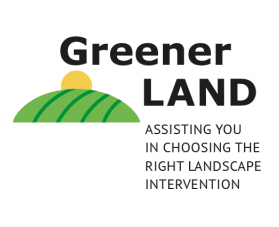Using the ecosystem services (ES) approach as the bridge between sustainable development and ecosystem-based adaptations (EbA), our Brazilian member, Maíra Padgurschi, started a post-doctoral at the AmazonFACE Program. In task 5, the program aims to propose feasible and effective alternatives of adaptation to the impacts of climate change. In that context, Padgurschi’s study will investigate the EbA alternatives that could maintain a set of ES essential to sustainable development goals in a climate change scenario at the Amazon forest. The best EbAs identified will be modeled using a land-use model to provide alternatives for decision-makers to cope with climate adversities in the forest.
Greener.LAND – landscape restoration tool
Greener.LAND is an easy-to-use, intuitive, free and open-access online tool to educate and assist landscape practitioners on restoring their landscapes.
This online tool provides the possibility to learn about the up-and-coming topic of landscape restoration and its importance for re-establishing ecosystem functions. But Greener.LAND also, and especially, serves a practical aim: it helps to choose the most suitable restoring measure for a landscape. [Read more…] about Greener.LAND – landscape restoration tool
2020 Natural Capital Symposium, Stanford, US
The 2020 Natural Capital Symposium will be held at Stanford University on 16-18 March 2020. This event is a major convening of leaders advancing the science and practice of incorporating nature’s diverse values into decisions.
This year the Symposium will be focusing on two key themes: 1) re-envisioning development planning at national and regional scales and 2) sustainable, livable cities.
Registration is now open. Early-Bird discount ends 16 December 2019. Registration closes 28 February 2020.
The call for abstracts is open until 22 November. Poster Abstracts are due 31 January 2020.
Find out more at the official event website.
New handbook published: Landscape Planning with Ecosystem Services
While human well-being depends upon the conservation and sustainable use of biodiversity and ecosystem services, global changes and unsustainable human activities increasingly threaten the world’s capacity to deliver those services over the long term.
In Europe and beyond, a solution to such challenges can be found by merging landscape planning with ecosystem services concepts. Landscape planning has strengths in recognition of public benefits and implementation mechanisms, while the ecosystem services approach makes the connection between the status of natural assets and human well-being more explicit. It can also provide an economic perspective, focused on individual preferences and benefits, which helps validate the acceptability of environmental planning goals. Thus linking landscape planning and ecosystem services provides a two-way benefit, creating a usable science to meet the needs of local and regional decision making. [Read more…] about New handbook published: Landscape Planning with Ecosystem Services
Swiss Climate Summer School 2020
The Swiss Climate Summer School 2020 takes places on 23 – 28 August in Grindelwald, Switzerland. It invites young researchers (PhD and Posdoc) from all fields of climate research and is focusing on the theme “Extreme weather and climate: from atmospheric processes to impacts on ecosystems and society”. This theme has been chosen due to its paramount importance in terms of both scientific challenges and pressing societal concerns.
Click here for more information.




